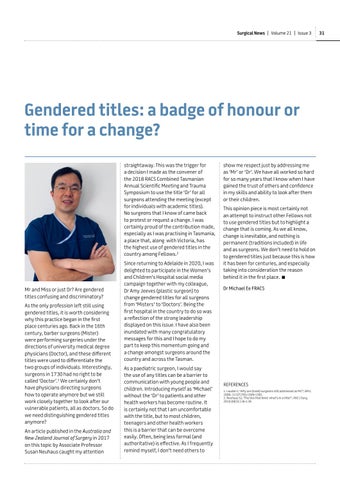Surgical News | Volume 21 | Issue 3
Gendered titles: a badge of honour or time for a change? straightaway. This was the trigger for a decision I made as the convener of the 2018 RACS Combined Tasmanian Annual Scientific Meeting and Trauma Symposium to use the title ‘Dr’ for all surgeons attending the meeting (except for individuals with academic titles). No surgeons that I know of came back to protest or request a change. I was certainly proud of the contribution made, especially as I was practising in Tasmania, a place that, along with Victoria, has the highest use of gendered titles in the country among Fellows.2
Mr and Miss or just Dr? Are gendered titles confusing and discriminatory? As the only profession left still using gendered titles, it is worth considering why this practice began in the first place centuries ago. Back in the 16th century, barber surgeons (Mister) were performing surgeries under the directions of university medical degree physicians (Doctor), and these different titles were used to differentiate the two groups of individuals. Interestingly, surgeons in 1730 had no right to be called ‘Doctor’.1 We certainly don’t have physicians directing surgeons how to operate anymore but we still work closely together to look after our vulnerable patients, all as doctors. So do we need distinguishing gendered titles anymore? An article published in the Australia and New Zealand Journal of Surgery in 2017 on this topic by Associate Professor Susan Neuhaus caught my attention
Since returning to Adelaide in 2020, I was delighted to participate in the Women’s and Children’s Hospital social media campaign together with my colleague, Dr Amy Jeeves (plastic surgeon) to change gendered titles for all surgeons from ‘Misters’ to ‘Doctors’. Being the first hospital in the country to do so was a reflection of the strong leadership displayed on this issue. I have also been inundated with many congratulatory messages for this and I hope to do my part to keep this momentum going and a change amongst surgeons around the country and across the Tasman. As a paediatric surgeon, I would say the use of any titles can be a barrier to communication with young people and children. Introducing myself as ‘Michael’ without the ‘Dr’ to patients and other health workers has become routine. It is certainly not that I am uncomfortable with the title, but to most children, teenagers and other health workers this is a barrier that can be overcome easily. Often, being less formal (and authoritative) is effective. As I frequently remind myself, I don’t need others to
show me respect just by addressing me as ‘Mr’ or ‘Dr’. We have all worked so hard for so many years that I know when I have gained the trust of others and confidence in my skills and ability to look after them or their children. This opinion piece is most certainly not an attempt to instruct other Fellows not to use gendered titles but to highlight a change that is coming. As we all know, change is inevitable, and nothing is permanent (traditions included) in life and as surgeons. We don’t need to hold on to gendered titles just because this is how it has been for centuries, and especially taking into consideration the reason behind it in the first place. Dr Michael Ee FRACS
REFERENCES 1. Loudon I, ‘Why are (male) surgeons still addressed as Mr?’; BMJ. 2000; 321(7276):1589-1591. 2. Neuhaus SJ, ‘The ties that bind: what’s in a title?’; ANZ J Surg. 2018;88(3):136-139.
31





























